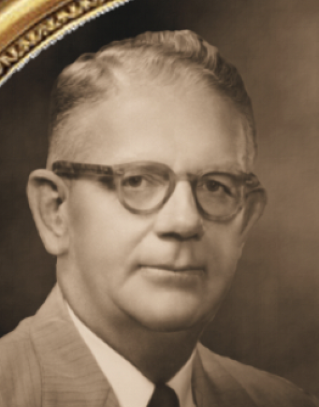
Governor Kerr Scott (1896–1958) appointed Rufus Jennings White to serve on East Carolina’s board for a term of six years, from 1949–1955. During White’s tenure, East Carolina as led by President John D. Messick (1897–1993) enjoyed sustained growth in physical infrastructure, enrollment, and faculty numbers. Most notably, White saw the student body become, for the first time in its history, not simply coeducational in principle, but in reality, with near equity in its gender divide as approximately equal numbers of male and female students enrolled in the early 1950s. Also, White witnessed the academic elevation of the school as a four-year liberal arts college, East Carolina College. No sooner had that plateau been reached than talk began in various corners about the school’s ultimate mission as a university for the eastern part of the state.
Although not a driving figure in these developments, White, an attorney and postmaster in Conway, Northampton County, surely supported the school’s progress. In Northampton County, he was active in Democratic Party politics, the Conway Ruritan Club, the Pendleton Masonic Lodge No. 524, the American Legion Post 111, and the Conway Baptist Church. He also served one term in the state legislature in the early 1930s representing Northampton County. During the 1940s, in addition to serving as postmaster of Conway, he began to develop farmland he owned into a business and residential subdivision of that town.
White missed two of the more consequential board meetings of the early 1950s related to the admission of non-white students, making it is difficult to assess his standing on that count. At the November 20, 1951 meeting, President Messick read “a request that scholarships be granted Korean students to study at East Carolina College.” No doubt, this request issued from the war-torn circumstances on the Korean peninsula resulting from the Korean War, 1950-1953. The board responded via appeal to the school’s charter stating that East Carolina was established “for the purpose of giving young white men and women such education….” Therefore, “Korean students could not be admitted here, even if the college had scholarships, which it does not.”
White also missed the May 22, 1954 meeting, held just days after the Supreme Court’s May 17, 1954 Brown v. Board of Education decision declaring “separate but equal,” i.e., segregated, facilities in public schools unconstitutional. In response, the trustees decided to “continue to adhere to its charter … unless or until instructed by higher authority to do otherwise.” This approach, ostensibly upholding the laws governing the school even while sidestepping the authority of the highest court in the land, suggested that the board remained unprepared to welcome the new progressive order of racial equity and inclusion.
White did attend the May 17, 1952 board meeting at which President Messick reported that the Cherry Point Marine base had inquired about the possibility of extension classes being offered on the base at which “Negro Marines would be admitted if they chose to enroll.” The minutes record that the board decided to take no action other than to inform the officials of the Marine Corps that the college’s charter precluded admission of non-white students.
While no vote was taken, the tacit consent of the board, including White, is implied in the minutes of the May 17, 1952 meeting, suggesting that White would have concurred with the other decisions made by the board in 1951 and 1954, affirming the Jim Crow charter rather than seeking a path to a more inclusive campus. Once again, though White was hardly the leading force behind the board’s policy regarding admission of non-white students, he, like the other board members affirmed the segregationist status quo even as monumental social change drew near. White’s term expired in 1955, just as challenges to East Carolina’s standing as a segregated college began to multiply.
Sources
- “48-Year-Old Conway Baptist Church Now Free of Debt.” News and Observer. February 14, 1953. P. 9.
- “Deaths and Funerals: R. Jennings White.” News and Observer. June 19, 1959. P. 21.
- “East Carolina College Board of Trustees minutes, May 17, 1952.” University Archives # UA01.01.01.01.04. J. Y. Joyner Library. East Carolina University. Greenville, N. C. https://digital.lib.ecu.edu/10264
- “East Carolina College Board of Trustees minutes May 22, 1954.” University Archives # UA01.01.01.01.04. J. Y. Joyner Library. East Carolina University. Greenville, N. C. https://digital.lib.ecu.edu/10268
- “East Carolina College Board of Trustees minutes, November 20, 1951.” University Archives # UA01.01.01.01.04. J. Y. Joyner Library. East Carolina University. Greenville, N. C. https://digital.lib.ecu.edu/10266
- “Scott Announces 17 More Appointments.” News and Observer. June 15, 1949. P. 18.
- “Tar Heel Postmasters Confirmed by Senate.” News and Observer. February 9, 1937. P. 5.
- “Three Commissioned Postmasters in N. C.” Charlotte Observer. March 11, 1937. P. 16.
- “Under the Dome.” News and Observer. November 7, 1952. P. 8.
- “U. S. Senate Confirms Carolina Postmasters.” Charlotte Observer. February 9, 1937. P. 16.
Citation Information
Author: John A. Tucker, PhD
Date of Publication: 02/17/2023